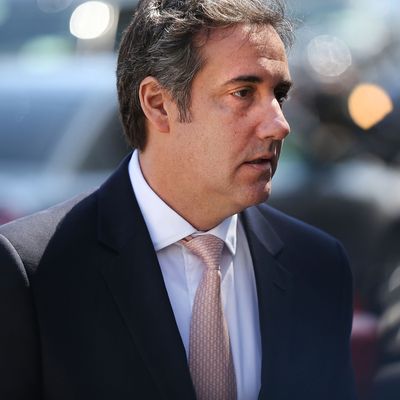
Michael Cohen has testified that President Trump directed him to lie to Congress about Trump’s business dealings with Russia during the campaign. The weakness of the accusation is that Cohen does not seem to have any proof, other than his own testimony, that the conversation took place. But now CNN reports that Cohen has evidence of Trump obstructing justice by dangling a pardon. And this time he has receipts.
Robert Costello, an attorney working with Rudy Giuliani, emailed Cohen on April 21. The emails assured Cohen he could “sleep well tonight” because he had “friends in high places,” according to CNN.
This is a really, really big deal. The power to pardon convicted criminals for federal crimes is a legitimate use of presidential authority. Whether it’s legitimate for the president to use this power to pardon criminals who committed crimes on his behalf, or might have otherwise testified against him, is a subject of intense debate.
What’s not a subject of intense debate is whether a president can dangle a pardon. As Alex Whiting explained, the argument for why a president can pardon his own subordinates is that it’s a public act, and the voters can examine the facts and look at whether the president acted corruptly in issuing the pardon. “As long as it remained secret,” he notes, “it could be done without incurring any of the political downstream consequences that come with actually pardoning someone.”
Even as staunch an advocate of presidential authority as William Barr agreed in his confirmation hearings that dangling pardons could be obstruction of justice. “Do you believe a president could lawfully issue a pardon in exchange for the recipient’s promise to not incriminate him?” asked Senator Pat Leahy. “No. That would be a crime,” replied Barr.
Barr, of course, almost certainly got his job because he wrote a long, unsolicited memo aggressively defending the president from charges of obstructing justice. If not even Barr can defend the dangling of a pardon, it’s safe to say that legal opinion will be unanimous.
The weakness in the evidence here is that the communication went through Costello, not Trump. Costello was representing Giuliani, who in turn was representing the president.
But the emails would be powerful evidence of an undeniable act of obstruction of justice. To begin with, Costello might be asked to testify to Congress about it pretty soon.
Costello tells the Daily Beast his message to Cohen was not a reference to getting a pardon from his highly-placed ally, but a reference to a Garth Brooks song:
“To repeat myself, Michael Cohen and his counsel’s interpretation of events is utter nonsense,” Costello said. “This statement: ‘Sleep Well tonight, you have friends in high places’ was a tongue-in-cheek reference to a Garth Brooks song, to a client whose state of mind was highly disturbed and had suggested to us that he was suicidal. We were simply trying to be decent human beings. There is no hidden message.”
That’s possible depending on the context of the communication. But it seems pretty unlikely. The song, “Friends in Low Places,” is just about drinking in a bar with buddies. Cohen actually did have a friend in a high place.
The New York Times reports federal prosecutors have requested copies of the emails. It also adds that, after the “friends in high places line,” Costello wrote, “Some very positive comments about you from the White House. Rudy noted how that followed my chat with him last night.” That doesn’t sound like counseling a depressed friend. It sounds a lot like floating a pardon in return for keeping your mouth shut.
This post has been updated.






























